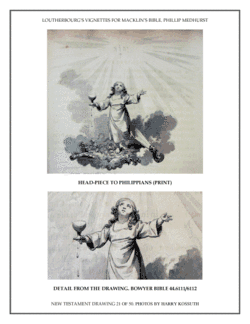Philippians 2
Philippians 2 is the second chapter of the Epistle to the Philippians in the New Testament of the Christian Bible. It is authored by Paul the Apostle about mid-50s to early 60s AD and addressed to the Christians in Philippi.[1] Jesuit theologian Robert Murray notes that a narrative in verses 5-11 about Christ, "who humbled himself, by becoming obedient to death" is central to this chapter.[2] German protestant theologian Ernst Lohmeyer argued in 1928 that verses 6-11 were an existing hymn about Christ which Paul quotes in his letter, a theory which "has come to dominate both exegesis of Philippians and study of early Christology and credal formulas".[3]
| Philippians 2 | |
|---|---|
 Head-piece to Philippians. Philippians 2:7-8. Print made by James Heath. 1800. Published by T. Macklin, London. | |
| Book | Epistle to the Philippians |
| Category | Pauline epistles |
| Christian Bible part | New Testament |
| Order in the Christian part | 11 |
Text
The original text was written in Koine Greek. This chapter is divided into 30 verses.
Textual witnesses
Some early manuscripts containing the text of this chapter are:
- Codex Vaticanus (AD 325-350)
- Codex Sinaiticus (330-360)
- Codex Alexandrinus (400-440)
- Codex Ephraemi Rescriptus (~450; complete)
- Codex Freerianus (~450; extant verses 1-3, 12-14, 25-27)
- Codex Claromontanus (~550)
Unity of Minds and Hearts (2:1–4)
This section centers on Paul's appeal for unity of minds and hearts among the people, which can be expressed by four phrases: two using the keyword phronein ("of the same mind" or "of one mind"), then agape ("love") and sumpsuchoi ("united in soul" or "being in full accord").[4] Maintaining his reference to the joy which Paul already feels in respect to the Philippians (verses 1:4 and 1:25), he speaks of this joy being "made full, like a measure".[5]
Christ as the Focus and Model for Discipleship (2:5–11)
Following the exhortation in the earlier section, Christ is pointed as the model for discipleship, with a poetic narrative "beyond Paul's usual vocabulary", but not necessarily beyond his capacity.[6]
Verse 5
This verse uses the same word phronein which Paul used at the start of this chapter.
Verse 6
- who, being in the form of God, did not consider it robbery to be equal with God,[8]
Verse 7
- but made Himself of no reputation, taking the form of a bondservant, and coming in the likeness of men. [9]
- "Made Himself of no reputation": or "nevertheless emptied himself"; he lost nothing of what he had, but the glory of his divine nature was covered and hid from the people so they reputed him as a mere man.[10]
- "Taking the form of a bondservant" (KJV: "took upon him"): voluntarilly, was not obliged, or forced to be in the form of a servant, as was often prophesied in Isaiah 42:1; 52:13, Zechariah 3:8, also called in the Targum, "my servant the Messiah".[10]
- "In the likeness of men": not the likeness of the first Adam, but in the likeness of sinful flesh, and was traduced and treated as a sinner, numbered among transgressors: a strange and surprising difference is that he who was "equal to God", should be "like to [sinful] men!".[10]
Verse 8
- And being found in appearance as a man, He humbled Himself and became obedient to the point of death, even the death of the cross.[11]
The Desired Response (2:12–18)
Based on Christ's example, Paul exhorts the people to "work out your own salvation... for it is God who is at work".[12]
Timothy and Epaphroditus, Paul's Go-Betweens (2:19–30)
Two of Paul's helpers, Timothy and Epaphroditus, are introduced and the reasons for their journey are explained in this part, mainly to show Paul's affection to the people of Philippi.[13]
See also
- Epaphroditus
- Knowledge of Christ
- Timothy
- Related Bible parts: Isaiah 66, John 1, John 8, John 14, John 20, Romans 8, 2 Corinthians 8, Galatians 5, Hebrews 7
References
- Murray 2007, pp. 1179–1180.
- Murray 2007, pp. 1181.
- Murray 2007, pp. 1180.
- Murray 2007, pp. 1183.
- Meyer, H. A. W. (1880), Meyer's NT Commentary on Philippians 2, accessed 1 June 2020
- Murray 2007, pp. 1184.
- Philippians 2:5 NKJV
- Philippians 2:6 NKJV
- Philippians 2:7 NKJV
- John Gill's Exposition of the Entire Bible, - Philippians 2:7
- Philippians 2:8 NKJV
- Murray 2007, pp. 1186.
- Murray 2007, pp. 1187.
Bibliography
- Coogan, Michael David (2007). Coogan, Michael David; Brettler, Marc Zvi; Newsom, Carol Ann; Perkins, Pheme (eds.). The New Oxford Annotated Bible with the Apocryphal/Deuterocanonical Books: New Revised Standard Version, Issue 48 (Augmented 3rd ed.). Oxford University Press. ISBN 9780195288810.
- Murray, SJ, Robert (2007). "69. Philippians". In Barton, John; Muddiman, John (eds.). The Oxford Bible Commentary (first (paperback) ed.). Oxford University Press. pp. 1179–1190. ISBN 978-0199277186. Retrieved February 6, 2019.
External links
- Philippians 2 King James Bible - Wikisource
- English Translation with Parallel Latin Vulgate
- Online Bible at GospelHall.org (ESV, KJV, Darby, American Standard Version, Bible in Basic English)
- Multiple bible versions at Bible Gateway (NKJV, NIV, NRSV etc.)